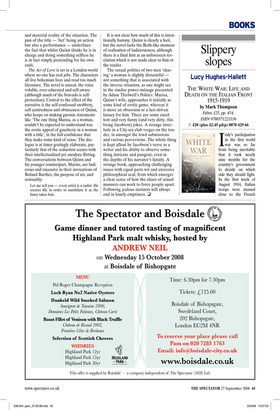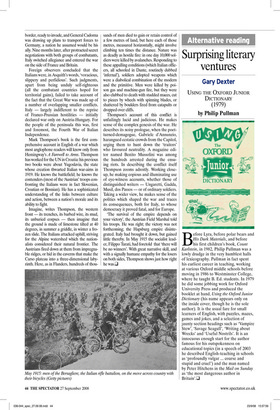Slippery slopes
Lucy Hughes-Hallett
THE WHITE WAR: LIFE AND DEATH ON THE ITALIAN FRONT
1915-1919
by Mark Thompson Faber, £25, pp. 454, ISBN 9780571223336 ✆ £20 (plus £2.45 p&p) 0870 429 66 Italy’s participation in the first world war was so far from being inevitable that it took nearly nine months for the country’s government to decide on which side they should fight. In the first week of August 1914, Italian troops were massed close to the French border, ready to invade, and General Cadorna was drawing up plans to transport forces to Germany, a nation he assumed would be his ally. Nine months later, after protracted secret negotiations with both groups of combatants, Italy switched allegiance and entered the war on the side of France and Britain.
Foreign observers concluded that the Italians were, in Asquith’s words, ‘voracious, slippery and perfidious’. Such judgments, apart from being unduly self-righteous (all the combatant countries hoped for territorial gains), failed to take account of the fact that the Great War was made up of a number of overlapping smaller conflicts. Italy — largely indifferent to the reprise of Franco-Prussian hostilities — initially declared war only on Austria-Hungary. For the people of the peninsula this was, first and foremost, the Fourth War of Italian Independence.
Mark Thompson’s book is the first comprehensive account in English of a war which most anglophone readers will know only from Hemingway’s A Farewell to Arms. Thompson has worked for the UN in Croatia: his previous two books were about Yugoslavia, the state whose creation thwarted Italian war-aims in 1919. He knows the battlefield; he knows the contenders (most of the ‘Austrian’ troops confronting the Italians were in fact Slovenian, Croatian or Bosnian). He has a sophisticated understanding of the links between culture and action, between a nation’s morale and its ability to fight.
Imagine, writes Thompson, the western front — its trenches, its barbed wire, its mud, its unburied corpses — then imagine that the ground is made of limestone tilted at 40 degrees, in summer a griddle, in winter a frozen slide. The Italians attacked uphill, striving for the Alpine watershed which the nationalists considered their natural frontier. The Austrians fired down at them from impregnable ridges, or hid in the caverns that make the Carso plateau into a three-dimensional labyrinth. Here, as in Flanders, hundreds of thou sands of men died to gain or retain control of a few metres of land, but here each of those metres, measured horizontally, might involve climbing ten times the distance. Nature was as deadly as hostile fire: in one day 10,000 soldiers were killed by avalanches. Responding to these appalling conditions (which Italian officers, all schooled in Dante, routinely dubbed ‘infernal’), soldiers adopted weapons which were a diabolical combination of the modern and the primitive. Men were killed by poison gas and machine-gun fire, but they were also clubbed to death with studded maces, cut to pieces by wheels with spinning blades, or shattered by boulders fired from catapults or dropped over cliffs.
Thompson’s account of this conflict is unfailingly lucid and judicious. He makes sense of the complex genesis of the war. He describes its noisy prologue, when the poetturned-demagogue, Gabriele d’Annunzio, harangued ecstatic crowds from the Capitol, urging them to hunt down the ‘traitors’ who favoured neutrality. A magazine editor named Benito Mussolini was among the hundreds arrested during the ensuing riots. In describing the conflict itself Thompson zooms adroitly. Working closeup, he making copious and illuminating use of eye-witness accounts, whether those of distinguished writers — Ungaretti, Gadda, Musil, dos Passos — or of ordinary soldiers. Taking a wider view, he makes sense of the politics which shaped the war and traces its consequences, both for Italy, to whose democracy it proved fatal, and for Europe.
‘The survival of the empire depends on your victory’, the Austrian Field Marshal told his troops. He was right; the victory was not forthcoming; the Hapsburg empire disintegrated. Italy had brought it down, but gained little thereby. In May 1915 the socialist leader, Filippo Turati, had foretold that ‘there will be no winners’. With great narrative skill, and with a signally humane empathy for the losers on both sides, Thompson shows just how right he was.❑











































































 Previous page
Previous page